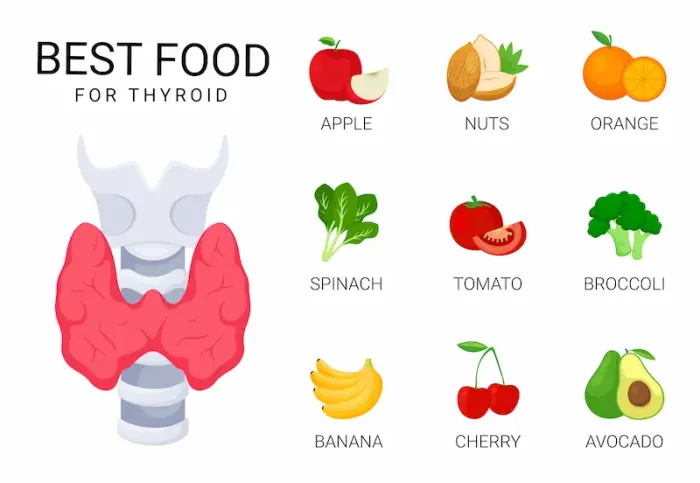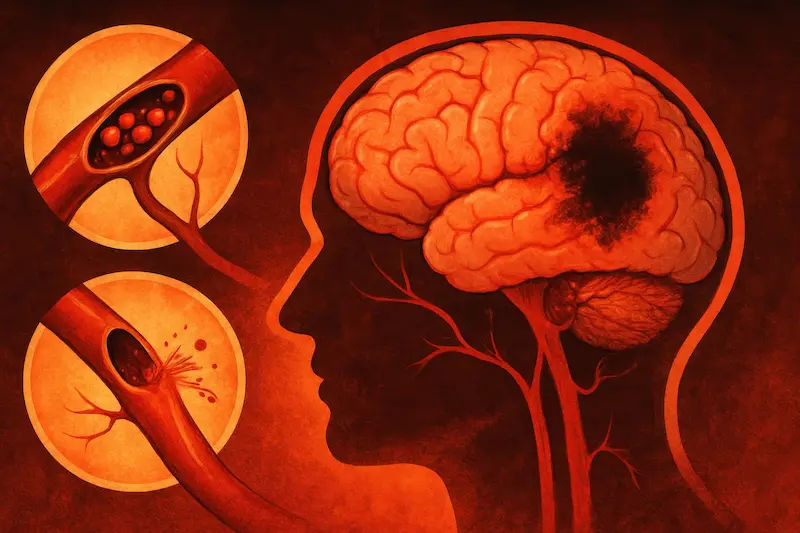Best Foods to Support Thyroid Health Naturally
Build a thyroid diet with smart hypothyroidism foods to support metabolism. Learn what to eat, what to limit, and tips for thyroid meds.

Written by Dr. M L Ezhilarasan
Reviewed by Dr. Rohinipriyanka Pondugula MBBS
Last updated on 13th Jan, 2026

Introduction
Your thyroid is a small gland with a big job—it helps regulate metabolism, energy, body temperature, and more. While food can’t cure thyroid disorders, the right thyroid diet can support the gland’s function, help you feel your best, and work alongside your treatment plan.
Below, you’ll find easy, evidence-based guidance on hypothyroidism foods to prioritize, what to limit, and simple habits that make your medication work better.
How the Thyroid Works—Quick and Simple
Here’s how thyroid works:
• The thyroid makes hormones (T4 and T3) that control how your body uses energy—your metabolism.
• Iodine is needed to make thyroid hormones.
• Selenium and zinc help activate and balance these hormones.
• If the thyroid underfunctions (hypothyroidism), you may feel tired, cold, constipated, or gain weight.
• If it overfunctions (hyperthyroidism), you may feel anxious, hot, or have a fast heartbeat.
Tip: Always see your healthcare provider for diagnosis and treatment.
What to Eat: Building a Thyroid-Friendly Plate
A balanced pattern works best—plenty of whole foods, lean protein, healthy fats, and colourful fruits and vegetables. Here are key nutrients and foods that help your thyroid stay healthy:
Iodine: The Raw Material for Thyroid Hormones
Why it matters: Iodine is essential for making T4 and T3. Too little can cause thyroid problems, but too much can also be harmful.
Smart choices:
• Iodized salt (in small amounts when cooking)
• Dairy (yogurt, milk), eggs
• Ocean fish and shellfish (cod, shrimp)
• Seaweed (nori, wakame, kelp) occasionally—iodine levels vary
Tips:
• Avoid high-dose iodine or kelp supplements unless prescribed.
• Use iodized salt if you cook mostly from scratch.
Selenium: Helps Activate Thyroid Hormone and Protect the Gland
Why it matters: Selenium supports enzymes that convert T4 to active T3 and protects thyroid tissue.
Smart choices:
• Brazil nuts (1–2 occasionally is enough)
• Tuna, sardines, salmon
• Poultry, eggs
• Legumes and whole grains
Tip: Don’t overdo Brazil nuts—selenium toxicity can occur with excess intake.
Zinc and Iron: Partners in Hormone Production and Activation
Why they matter: Zinc aids T4 to T3 conversion; iron helps your body produce thyroid hormone.
Smart choices:
• Zinc: oysters, shellfish, beef, poultry, beans, pumpkin seeds
• Iron: lean red meat, beans, lentils, tofu, spinach, fortified cereals
Tip: Pair iron-rich foods with vitamin C sources (like citrus or tomatoes) to boost absorption.
Vitamin D and Calcium: Bone and Immune Support
Why they matter: Thyroid disorders can affect bone strength. Vitamin D aids immunity, while calcium supports muscles and bones.
Smart choices:
• Vitamin D: fatty fish, egg yolks, fortified milk, sunlight
• Calcium: dairy or fortified plant milk, leafy greens, tofu, almonds
Tip: Ask your clinician to check your vitamin D levels before supplementing.
Omega-3 Fats: Heart and Inflammation Support
Why they matter: Omega-3s help heart health and inflammation balance.
Smart choices:
• Salmon, sardines, trout
• Walnuts, chia, and flaxseed
Fibre and Fluids: For Regularity and Steady Energy
Why they matter: Hypothyroidism can slow digestion. Fibre helps with gut health and fullness.
Smart choices:
• Whole grains (oats, quinoa, brown rice)
• Beans, lentils
• Fruits (berries, pears, apples) and vegetables (leafy greens, carrots)
• Plenty of water and unsweetened beverages
Tip: Increase fiber slowly and separate high-fibre supplements from thyroid medication.
Protein at Every Meal: Steady Metabolism and Muscle Support
Why it matters: Adequate protein preserves muscle mass and supports a healthy metabolism.
Smart choices:
• Fish, poultry, eggs
• Beans, lentils, tofu, tempeh
• Greek yogurt or cottage cheese
What About Goitrogens and Soy?
Here are some vegetables that are good for thyroid:
Cruciferous Vegetables
• Include broccoli, cauliflower, Brussels sprouts, kale, cabbage
• Cooking lowers goitrogenic activity
• Bottom line: Enjoy them in normal amounts—they’re healthy!
Soy Foods
• Include tofu, tempeh, edamame, soy milk
• Medication tip: Soy can interfere with levothyroxine absorption.
o Separate soy-rich meals and thyroid pills by several hours (often 4 hrs).
Supplements and Your Thyroid: Proceed with Care
• Iodine: Extra isn’t better; avoid high doses.
• Selenium: Food sources are safest; ask your clinician before supplements.
• Biotin (Vitamin B7): Can distort thyroid blood test results—pause biotin 48 hrs before labs.
Smart Habits if You Take Thyroid Medication
Have a look at these smart habits if you take thyroid medication:
• Take levothyroxine on an empty stomach, same time daily.
• Wait 30–60 minutes before breakfast or coffee, or take it at bedtime 3–4 hours after your last meal.
• Separate from calcium, iron, soy, and antacids by 4 hours.
• Stay consistent with diet patterns to keep your dose stable.
• Keep follow-ups for lab checks and inform your provider about new supplements or diet shifts.Consult Top Specialists
Sample One-Day Thyroid-Friendly Menu
Here’s a sample one day thyroid friendly menu:
Breakfast
• Scrambled eggs with spinach and tomatoes
• Whole-grain toast with olive oil
• Berries on the side
• Coffee/tea after waiting time if medicated
Lunch
• Salmon salad with quinoa, greens, cucumber, and lemon-olive oil dressing
• Yoghurt or fortified soy milk
Snack
• Walnuts and an orange
Dinner
• Stir-fried tofu or chicken with broccoli, peppers, and brown rice
• Side of edamame if not near pill time
Hydration: Water or sparkling water through the day
Special Situations to Consider
Here are some special situations to consider:
• Pregnancy & Breastfeeding: Iodine needs rise; choose prenatal vitamins with iodine if advised.
• Vegetarian/Vegan: Plan for iodine (salt), selenium (nuts, grains), zinc (beans, seeds), and B12 (fortified foods or supplement).
• Celiac Disease: More common in autoimmune thyroiditis—test if symptomatic.
• Weight Changes: Treating hypothyroidism normalises metabolism; balanced eating, movement, and rest support healthy weight.
Putting It All Together
• Focus on whole, unprocessed foods.
• Use iodised salt and enjoy moderate seafood, dairy, and eggs.
• Include selenium, zinc, and iron sources regularly.
• Cook cruciferous veggies and space soy away from medication.
• Avoid “thyroid support” supplements unless prescribed.
• Work closely with your clinician for personalised care.Consult Top Specialists
Consult Top Specialists

Dr. Ramya Varada
Endocrinologist
10 Years • MD, DM
Chinagadila
Apollo Hospitals Health City Unit, Chinagadila
(150+ Patients)
Dr Sumanth R
General Physician
2 Years • MBBS
Bengaluru
PRESTIGE SHANTHINIKETAN - SOCIETY CLINIC, Bengaluru

Dr G Prathyusha
General Physician/ Internal Medicine Specialist
6 Years • MBBS DNB (Family medicine), CCEBDM (Diabetology), PGDGM (Geriatrics), Primary care Rheumatologist.
Bengaluru
PRESTIGE SHANTHINIKETAN - SOCIETY CLINIC, Bengaluru

Dr. Sushith C
General Physician
2 Years • MBBS
Bengaluru
PRESTIGE SHANTHINIKETAN - SOCIETY CLINIC, Bengaluru

Dr. Chaithanya R
Internal Medicine Specialist Diabetologist
16 Years • MBBS, MD Internal Medicine, Fellowship in Diabetes(UK), CCEBDM(PHFI)
Bangalore
Apollo Clinic Bellandur, Bangalore
(75+ Patients)
Consult Top Specialists

Dr. Ramya Varada
Endocrinologist
10 Years • MD, DM
Chinagadila
Apollo Hospitals Health City Unit, Chinagadila
(150+ Patients)
Dr Sumanth R
General Physician
2 Years • MBBS
Bengaluru
PRESTIGE SHANTHINIKETAN - SOCIETY CLINIC, Bengaluru

Dr G Prathyusha
General Physician/ Internal Medicine Specialist
6 Years • MBBS DNB (Family medicine), CCEBDM (Diabetology), PGDGM (Geriatrics), Primary care Rheumatologist.
Bengaluru
PRESTIGE SHANTHINIKETAN - SOCIETY CLINIC, Bengaluru

Dr. Sushith C
General Physician
2 Years • MBBS
Bengaluru
PRESTIGE SHANTHINIKETAN - SOCIETY CLINIC, Bengaluru

Dr. Chaithanya R
Internal Medicine Specialist Diabetologist
16 Years • MBBS, MD Internal Medicine, Fellowship in Diabetes(UK), CCEBDM(PHFI)
Bangalore
Apollo Clinic Bellandur, Bangalore
(75+ Patients)
More articles from General Medical Consultation
Frequently Asked Questions
1) What is the best thyroid diet?
A balanced diet with sufficient iodine, selenium, zinc, iron, and protein supports thyroid function. Focus on seafood, eggs, dairy or fortified alternatives, legumes, whole grains, fruits, vegetables, nuts, and seeds. Use iodised salt in small amounts. Your exact needs depend on your diagnosis and labs—ask your clinician for personalised guidance.
2) Which hypothyroidism foods should I avoid?
There’s no single “avoid” list for everyone. Most people can eat cruciferous vegetables and soy in normal portions, especially when cooked. Avoid high-dose iodine (including kelp supplements) unless prescribed. If you take levothyroxine, separate your pill from soy, iron, calcium, and high-fibre supplements by several hours to prevent absorption issues.
3) Is seaweed good for the thyroid?
Seaweed can be a source of iodine, but the iodine content varies a lot among types and brands. Occasional small amounts are fine for many people, but frequent large servings or kelp supplements can deliver excess iodine and may upset thyroid balance. If you eat seaweed regularly, discuss it with your clinician.
4) Can I lose weight with hypothyroidism?
Yes. Once thyroid hormone levels are well controlled, weight management follows the same fundamentals: balanced meals with adequate protein and fibre, reasonable portions, regular activity (including strength training), good sleep, and stress management. Progress may be gradual—steady habits matter more than quick fixes.
5) Do I need iodine or selenium supplements for my thyroid?
Most people can meet needs through food. Extra iodine or selenium isn’t automatically helpful and can be harmful in high doses. Your clinician may test levels and recommend supplements only if you have a deficiency or a specific medical reason.




.webp)